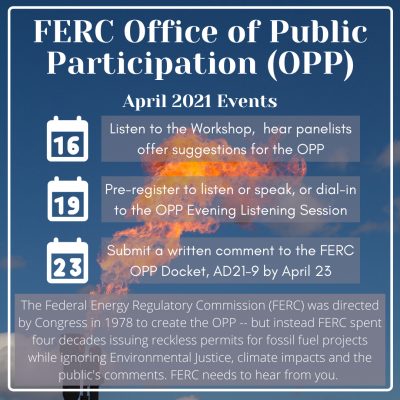Front Porch Blog
YOUR VOICE MATTERS
FERC is reviewing its public participation process and listening to stakeholders across the country. There is an urgent need for FERC to hear the voices of those who are directly impacted!
- April 16, 9 a.m.- 5p.m. (EST): Attend FERC’s workshop
- April 19, 6 p.m. – 9 p.m.(EST): Register for and participate in a FERC comment session
- April 23, by 4:59 p.m. (EST): Deadline to submit your comment directly to FERC
Learn more about how to get involved!
The OPP announcement came after four decades of inaction from the agency on this issue, which had originally been required in the 1970s. In the interim, hundreds of dirty gas pipelines received FERC certification, helping mire the nation in harmful, polluting infrastructure. Many of these projects are disproportionately located in communities of color, Indigenous communities and low-income communities.
In what seemed a hopeful development, the congressional requirement in December pushed the agency to finally take action on what has been the crucial missing piece from the entire FERC permitting process — the public. FERC was directed by Congress to develop the plan for the OPP be developed by June 25, 2021.
What we’ve seen in these past four decades is an industry-friendly outcome in nearly every permitting circumstance, gaining FERC a reputation as a rubber stamp for fossil fuel infrastructure. Those permits lead to impacted landowners experiencing seizure of their property through eminent domain, sometimes even though projects are stalled by legal challenges and may lose state or federal permits — or may never even be built. Landowners and others wanting to engage in the process are forced to navigate an archaic, opaque system that limits their access to information and impedes their pathway to reaching commissioners with their concerns — ultimately removing their voices from decisions which directly impact their communities and livelihoods.
It was welcome, but surprising news that the OPP had finally begun to materialize. This news had followed other encouraging signals of FERC’s understanding of the scope of the impact of its decisions, as commissioners recently publicly communicated the need for consideration of greenhouse gas emissions and cumulative impacts from the projects they review. These steps resonate as promising, because they stand in stark contrast to the preceding decades of little public or climate consideration.
The rollout of the process for establishing the Office of Public Participation came hurriedly, though, revealing the years of deficient public engagement. The limited number of sessions were advertised with just a couple weeks’ notice, and as specific to energy consumers, environmental justice communities, tribal governments and environmental justice communities. In the listening sessions, many participants expressed frustration on several fronts:
- How is FERC appropriately engaging Tribal communities?
- Why does the burden fall on the public for information requests?
- Why were so few listening sessions held?
- Why were sessions not accessible in other languages, or with captioning services?
The sessions also raised issues of accountability. What mechanism in this office provides accountability for FERC’s decisions? And, if public input is truly valued, could a Citizen Advisory Board be established, and how much power could that board have? How decision-makers weight the public’s input is a crucial and unexplained piece.
An Office of Public Participation has been critically needed for so long — but so far, its implementation raises many questions yet to be answered.
PREVIOUS
NEXT
Related News

Leave a comment
Your email address will not be published. Required fields are marked *

